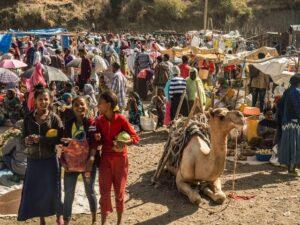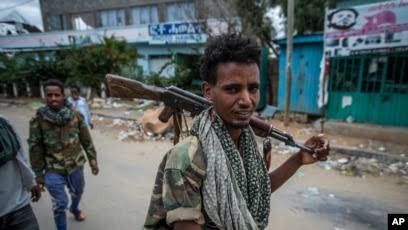ETHIOPIA CRISIS AND SOLUTION: The Ethiopian crisis is mounting concern to the continent as a whole. This is because of the possibility of a protracted, full-blown crisis of a political, military and humanitarian character that could potentially unfold in Ethiopia. It is also important to underscore that this crisis is taking place amidst the Covid-19 global pandemic. This conflict-pandemic nexus compounds the impact of the situation and undermines humanitarian efforts aimed at addressing issues blown up by the crisis.
The conflict in the Tigray region of Ethiopia has taken on a multidimensional character. Millions are facing hunger and starvation. Hundreds of thousands of people have been forced into internal displacement and tens of thousands have been forced to seek refuge outside their own homeland. Where governments are decapitated or otherwise deeply disrupted, the net consequence to the country is a total collapse of law and order, the emergence of chaos and anarchy, the amplification and compounding of State fragility, the facilitation of radicalisation, violent extremism and terrorism, the rise of intra-state conflict, the escalation of gender-based violence, an upsurge in food insecurity, hunger and starvation, intensification of transnational organised crime and the acceleration of the proliferation of small arms and light weapons.
In addition, the crisis has a worrying inter-country military dimension that has the potential of igniting cross-border wars across the Eritrea and Sudan frontiers. Equally concerning for neighbouring countries, the situation in Tigray has the potential of seeping into and disrupting the administration and governance of the rest of Ethiopia. This would upset the delicate balance of Federal States that constitute modern Ethiopia. All these factors have caused great concern across the peace and security fraternity throughout the world.
Since the beginning of the fighting in Tigray, regional leaders as well as African Ambassadors at the UNSC and the AUPSC have worked hard to cooperate with the international community to stop the fighting and prevent it from worsening in order to help stabilise and bring back normalcy to Ethiopia.
In doing so, the African leadership and their Ambassadors have focused on promoting key solutions. Unfortunately owing to the character of the crisis, these solutions have yet to be fully enacted. These include: The promotion of quiet but determined diplomacy. This is to drive the message home to the protagonists that war and violence-driven law enforcement are not viable solutions to responding to the original challenge that was faced by the Ethiopian government to law and order in the country. The salient point has been made, that the burden of responsibility to resolving this crisis falls squarely on the leadership in Addis Ababa.
The consistent message from AU Member States on the continent insists on promoting the cessation of hostilities in order to ensure full and unfettered humanitarian access by road, rail or air into the affected areas. This point has been echoed by many partner governments, institutions and the UN. Protagonists should also comply with international humanitarian law and desist from all forms of human rights abuses.
The facilitation of displaced people and refugees to return to their homeland to continue with their lives including their livelihoods.
The enactment and respect of a cross-lines ceasefire that will provide an opportunity for all of the above to happen. The burden of responsibility of securing and enforcing this ceasefire lies with all the protagonists. The international community and the African Union must have a special role to play in monitoring this ceasefire.
The promotion and facilitation of a national dialogue within Ethiopia that allows for transparent, democratic and participatory resolution of the conflict. This dialogue must be of an inter-regional and inter-ethnic character and managed by Ethiopians, with the leadership of the Ethiopian government, and the support of regional and international partners.
Finally, the standing down and withdrawal of foreign forces from the conflict; and equally critically the avoidance of further burdening of the Ethiopian governance challenge by other demands that have nothing to do with the conflict but which create great political and administrative stress on the Ethiopian government. In most countries, it is the most vulnerable who bear the greatest brunt of financial pressure on governments. Economic relief and development packages from partners are crucial in alleviating the plight of civilians trapped in the conflict.
African Ambassadors at the United Nations Security Council (UNSC) and the African Union Peace and Security Council (AUPSC) are charged with the responsibility of helping the world find solutions to this crisis. It is important that the international community rallies around the issues that led to the crisis and works together in finding and facilitating different tools for the different components in order to bring about lasting peace in Ethiopia.
African solutions to African problems do not in any way mean an abdication of the UN or the international community in helping bring to fruition solutions proposed by Africans.
We have witnessed the exemplary commitment from key international partners in trying to help Ethiopia find lasting solutions. This includes the direct, albeit quiet diplomacy of President Uhuru Kenyatta with the leadership of Ethiopia including with President Sahle-Work Zewde and Prime Minister Abiy Ahmed.
Other leaders in the region have intervened in a similar vein. The Special Envoy of President Joe Biden in the Horn of Africa Mr Jeffrey Feltman, partners within the European Union network of interlocutors and Ambassadors in the region, together with African leaders have continued to push Ethiopia to find a path to peace, security and stability.













